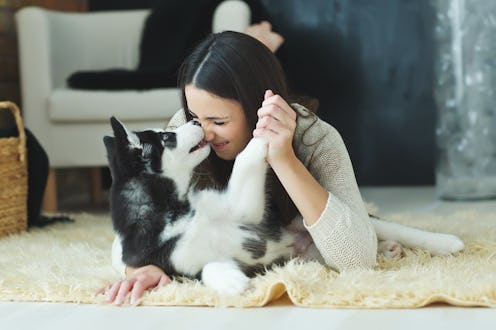Life
That Little Voice You Do When You Talk To Your Dog Is Actually Why They Love You So Much
So many of us talk to our dogs like they're babies. I sure do. You know what I'm referring to — that high-pitched voice we use when we say things like, "Do you have to go poopy woopy?" We might sound ridiculous, but we can't help it. Well, I have good news: research has found "dog-speak" could improve your relationship with your pet by strengthening the bond you have. So, feel free to keep up the poopy woopies. It's good for 'em.
The research comes from scientists at the University of York. Researchers aimed to find whether a human's tone and word choices could affect the social bonding between themselves and canines. While similar experiments have, in the past, simply played recordings of human voices to dogs, this one put a person and a dog in the same room — allowing them to see if dogs would behave differently in response to dog-speak, and also if they would want to spend more time with humans who used it.
The researchers had the participants conduct four kinds of speech tests that varied the tone used (high-pitched or regular) and the words used (dog-friendly or not). These were the four combinations of the two factors:
- Dog-directed speech with dog-related words ("You're a good boy!")
- Adult-directed speech with no dog-related words ("I went to the cinema last night.")
- Dog-directed speech with non-dog-related words
- Adult-directed speech with dog-related words
By mixing things up in the third and fourth tests, researchers could pinpoint specifically if it was the high-pitched tone or the specific words used that had an impact on dogs. While the participants recited various sentences, the dog's attention was measured, and afterward, they could pick their favorite speaker.
Their results were intriguing, to say the least. For starters, the dogs favored speakers that used dog-directed speech and dog-related words ("You're a good boy!") more than speakers who used adult-directed speech with no dog-related words ("I went to the cinema last night."). Here's where things get really interesting: when the researchers mixed and matched the tone and words used, dogs didn't have a preference for one speaker over the other. In other words, dogs prefer to hear both dog-directed speech and dog-related words — as opposed to hearing just one or the other.
This means I'm right on track when I tell my pup, "Who's the cutest doggie in the whole wide world???? YOU'RE the cutest doggie in the whole wide world!!!! Says WHO? Says ME!!!!!!" Other frank conversations I have with him about work or the responsibilities of adulthood? Not so much...
While eye-opening, these results maybe shouldn't be all that shocking.
After all, similar results have been found in babies with what is appropriately called "infant-directed speech." One study published in Child Development suggested exaggerated pitches could serve as strong signals for infants in communication development during the first months after birth. Another study published in The Official Journal of the International Congress of Infant Studies found infant-directed speech can help increase brain activity related to certain words.
Infant-directed speech is so powerful, in fact, it might even helps adults learn. Research published in the Journal of Child Language suggested infant-directed speech could help adults better learn words in a foreign language — in this case, Chinese.
While talking to dogs in that high-pitched voice is something a lot of us do innately — and although it might trigger some eye-rolls — know that when you do it, you might be strengthening your relationship with the pooch, teaching them cool new things about language and communication, and securing your spot as their number one favorite human. Giving them a few treats wouldn't hurt, either. Just saying.
